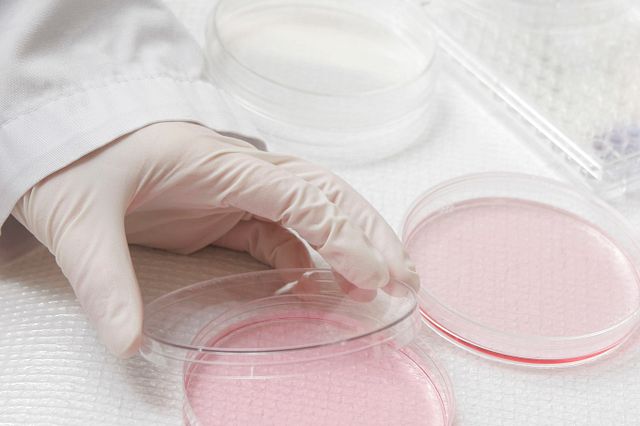Biocompatibility & Medical AM Testing
The integration of additive manufacturing (AM) techniques into medical applications has revolutionized the way medical devices are designed and manufactured. Biocompatibility testing is a critical step in ensuring that these advanced materials do not elicit adverse biological responses when used within the human body. This service focuses on assessing the biocompatibility of AM parts intended for use in medical applications, ensuring they meet stringent regulatory requirements.
Biocompatibility refers to the ability of a material or device to perform with an appropriate host response under specified conditions. The testing process evaluates how materials interact with biological systems and whether they induce harmful effects such as inflammation, toxicity, or immune responses. This is particularly important for AM parts because the manufacturing process can introduce contaminants or surface properties that may affect biocompatibility.
Our laboratory specializes in providing comprehensive biocompatibility tests tailored to the unique challenges posed by 3D printing and AM processes. We employ advanced analytical techniques and follow international standards such as ISO 10993-1, ISO 10993-5, and ASTM F2084 to ensure accurate and reliable results.
The testing process involves several key steps: sample preparation, extraction of leachable substances, cytotoxicity assessment, cell viability studies, and potential allergenicity evaluation. We use state-of-the-art equipment and follow rigorous protocols to ensure consistent and reproducible results. Our team of experts ensures that every test is conducted in compliance with relevant standards and guidelines.
Understanding the specific properties of AM materials is crucial for accurate biocompatibility testing. For instance, the porosity of a part can affect how cells interact with it, while surface roughness can influence protein adsorption and subsequent immune responses. We utilize specialized instruments like scanning electron microscopy (SEM), Fourier-transform infrared spectroscopy (FTIR), and X-ray diffraction (XRD) to characterize these properties in detail.
The results of biocompatibility tests are essential for regulatory approval and clinical use. They help ensure that medical devices made via AM are safe and effective, reducing the risk of adverse events. Compliance with international standards is a hallmark of our service, ensuring that your products meet global regulatory requirements.
Scope and Methodology
The scope of biocompatibility testing for medical additive manufacturing parts includes a comprehensive evaluation of potential biological interactions. This encompasses the extraction and analysis of leachable substances from the material, which may include metals, polymers, or other compounds used in AM processes.
Cytotoxicity assessments are performed to determine whether the material causes cell death or damage when exposed to cells in vitro. Cell viability studies evaluate how well cells can survive and function in the presence of the test material. These tests follow stringent protocols outlined in ISO 10993-5, which provides guidelines for evaluating cytotoxicity.
Additionally, we conduct potential allergenicity evaluations to assess whether the material may trigger allergic reactions. This is particularly important given that some AM processes use materials with known allergens or those that can release potentially allergenic substances during manufacturing or usage.
The methodology employed in our laboratory ensures that every test adheres to international standards and best practices. Our team of experts uses advanced analytical techniques to ensure accurate results, providing you with reliable data to support your product development and regulatory compliance efforts.
Benefits
Biocompatibility testing for medical AM parts offers numerous benefits that are crucial for the success of any medical device manufacturer. By ensuring that materials used in 3D printing do not elicit adverse biological responses, this service helps mitigate risks associated with product failure and potential harm to patients.
The testing process provides valuable insights into how materials interact with biological systems, allowing manufacturers to make informed decisions about material selection and processing parameters. This can lead to the development of safer and more effective medical devices.
Compliance with international standards ensures that your products meet regulatory requirements, facilitating smoother market entry and reducing the risk of product recalls or withdrawals. The results of biocompatibility tests are also important for insurance coverage and liability protection, providing a layer of assurance for both manufacturers and healthcare providers.
In addition to regulatory compliance, these tests can enhance brand reputation by demonstrating a commitment to quality and safety. This is particularly valuable in the medical industry, where trust and reliability are paramount. By offering biocompatibility testing services, we help you build strong relationships with regulators, customers, and other stakeholders.
Why Choose This Test
Choosing biocompatibility testing for your medical AM parts is a strategic decision that can significantly impact the success of your product. Here are several reasons why this test is essential:
Regulatory Compliance: Ensuring compliance with international standards such as ISO 10993-1 and ASTM F2084 is crucial for regulatory approval. Our laboratory provides detailed reports that meet these requirements, facilitating smoother market entry.
Risk Mitigation: By identifying potential biocompatibility issues early in the development process, you can avoid costly delays and recalls. This proactive approach helps protect your brand's reputation and ensures product safety.
Enhanced Product Quality: Testing provides valuable insights into how materials interact with biological systems, allowing for informed decisions about material selection and processing parameters. This leads to the development of safer and more effective medical devices.
Customer Satisfaction: Demonstrating a commitment to quality and safety enhances customer trust and satisfaction. In the medical industry, where patient safety is paramount, this can be a significant differentiator in the marketplace.
Insurance Coverage: Biocompatibility test results are often required for insurance coverage and liability protection. Our comprehensive testing ensures that you have all necessary documentation to secure these important protections.
Innovation: By staying ahead of regulatory requirements, you can innovate with confidence, knowing that your products will meet the highest standards of safety and effectiveness.





